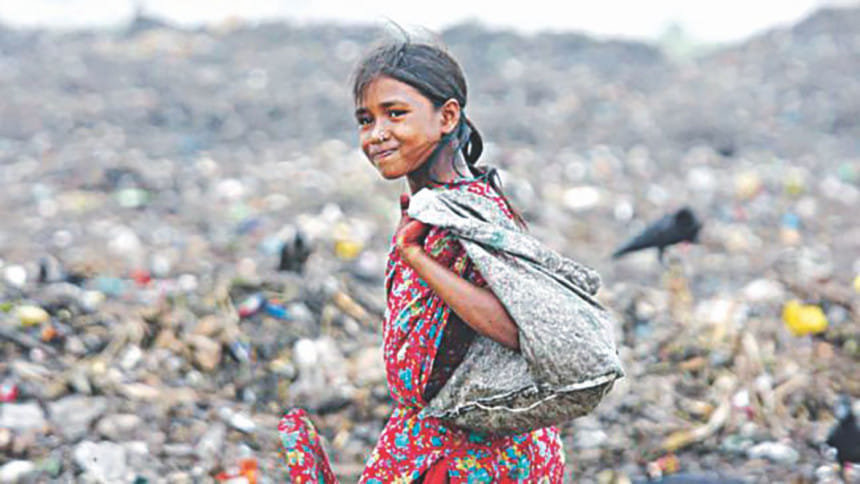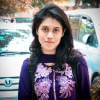Sexual abuse is part of life for street children

Dhaka's bustling streets are both a workplace and a home for 14-year-old Amina.
She navigates the bustling streets selling flowers by day and sleeping on the footpath at night -- her undernourished frame becoming just one among the countless other children who call Bangladesh's streets their home.
According to a Unicef study, titled "Children Living in Streets Situations in Bangladesh 2024", over 3.4 million children find themselves in street situations in Bangladesh without parental care.
Sexual molestation has been highlighted as one of the physical and social environment risk factors for street children.
Amina is no stranger to that potential danger, especially without the safety of a family. Two years ago, she lost her mother at a young age. Then she came to Dhaka, escaping her abusive father and stepmother in Munshiganj.
"My father used to beat me for being a girl child. He remarried, and my stepmother and her family members tortured me as well. They did not give me food when I was hungry. They used to make me do all the household chores all by myself," she shared. "I don't have any shelter in Dhaka. I live and sleep in the streets with other girls and boys," she added.
Sharing the problems she faces on the streets, Amina said, "I have only two frocks. When I change my clothes behind a tree or a bush, male pedestrians stare at me. That scares me."
"Sometimes men touch my hands and shoulders when I sell them flowers. Sometimes, they even offer to take me elsewhere. But I do not go near them after they say such things," she said.
Amina's greatest fear, however, is nighttime when she has to sleep in a park. "Night is a horrible time for me. I always have to be cautious worrying what if someone does anything bad to me as the (Suhrawardy) Udyan is filled with bad people."
The fear of sexual harassment or assault also haunts parents who live with their adolescent daughters out in the open. Kushum, 13, lives with her mother in the street. Her mother begs, and she sells lozenges in a small red bucket.
Kushum's mother said, "Roaming around Ramna Park and Udyan, we encounter many men taking drugs. These people try to be nice to us, which terrifies me more."
"I always tell my daughter not to take anything from men and eat anything they offer. At night, I wake up frequently to check on my daughter as the surroundings are not safe, and my daughter is now an adolescent," she added.
Kushum said, "People sitting inside the parks sometimes offer money to go with them. I run away from there as fast as possible."
This correspondent talked to 15 street children, mostly adolescent girls who live in the same fear of getting sexually harassed.
Street children in Bangladesh face a harsh reality of deprivation, poverty, malnutrition, disease, illiteracy, and violence. UNICEF's 2022 survey reveals that many sleep alone or in groups for safety, and one-third experience violence during sleep. Shockingly, passersby are responsible for most of the abuse and harassment of street children in Bangladesh, with eight out of 10 children reporting such incidents. However, there were no separate statistics on sexual violence.
The survey findings are based on first-hand reports from a sample of 7,200 children aged 5-17 years in hotspots in Dhaka and in the country's eight divisions.
Prof Tahmina Akhter of Institute of Social Welfare and Research noted that there is an absence of study on sexual abuse of street children in our country. Based on her research, she said female street children are often sexually harassed at a young age by law enforcement officers, rickshaw pullers, or bus and truck drivers. "Especially those who sleep on the streets face more sexual harassment," she said.
"Sometimes these children face sexual violence from their relatives at home because of lack of parental care," she said.
Living without parental guidance, sometimes these children, after reaching puberty, also began to explore their sexuality early, getting involved in unsafe sexual activities amongst themselves, Tahmina said, adding that miscreants lure children by promising to marry them and then sell them to brothels.
Tahmina said these street children don't tell anyone or take legal action even if they are subjected to any sexual abuse. Sometimes, they do not even realise that they have been subjected to sexual violence.
Wahida Banu, executive director of Aparajeyo Bangladesh, an NGO working with children, youth, and women living in and around Dhaka slums since 1976, had a similar view.
She said, "Whether it's on the road, in a park, or in a crowded place, most girls and boys living on the streets face sexual harassment. They don't understand the abuse when they are young, but they realise it when they grow up."
Wahida said the issue of sexual harassment of street children is not prioritised in our society. Adolescent girls growing up on the streets do not understand prostitution. They get involved in sexual activities, accepting it as a norm, she said.
Sometimes, street children get molested in exchange for money as low as Tk 5/10, she added.
Wahida noted that although the Children Act 2013 talks about underprivileged children, there is no legal framework through which they can access justice. Although there are many government facilities, such as shelter homes and services like the 1098 hotline number, street children do not know about them, nor can they avail those services, she added.
"Our laws are not pro-children," she said. "To bring street children under legal help for violence perpetrated against them, they require guardianship. Otherwise, these children, who are completely alone, will not get any justice."

 For all latest news, follow The Daily Star's Google News channel.
For all latest news, follow The Daily Star's Google News channel. 



Comments